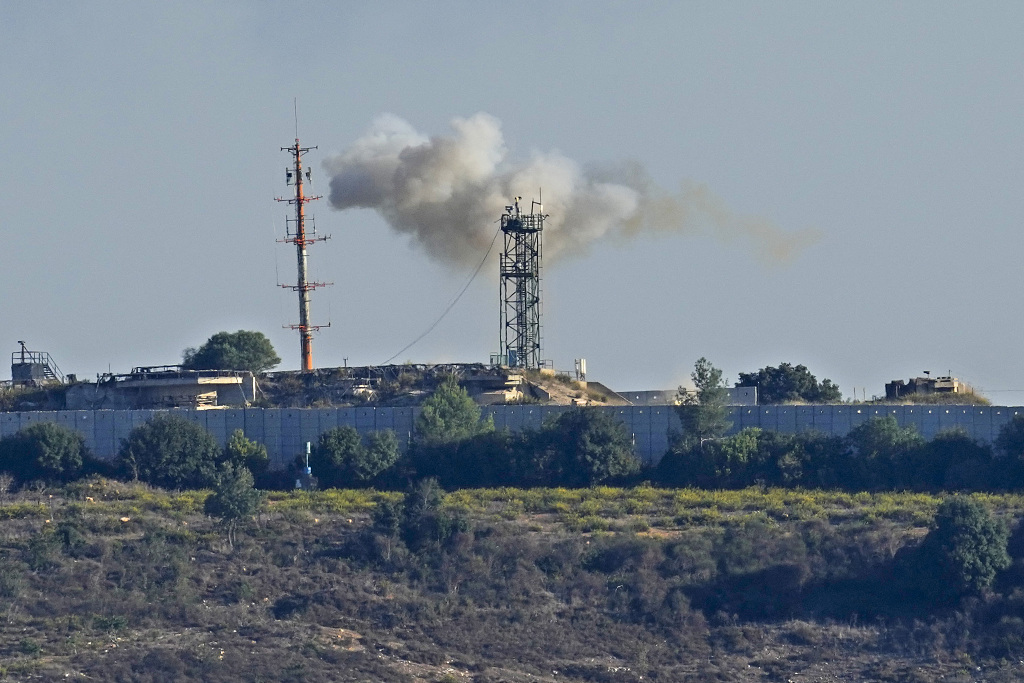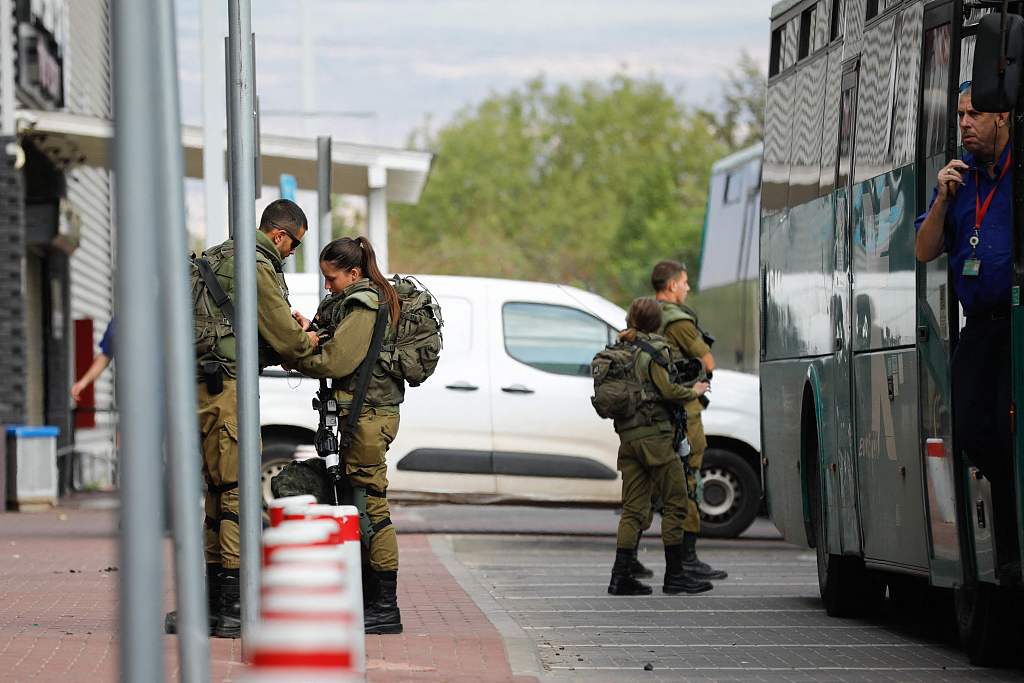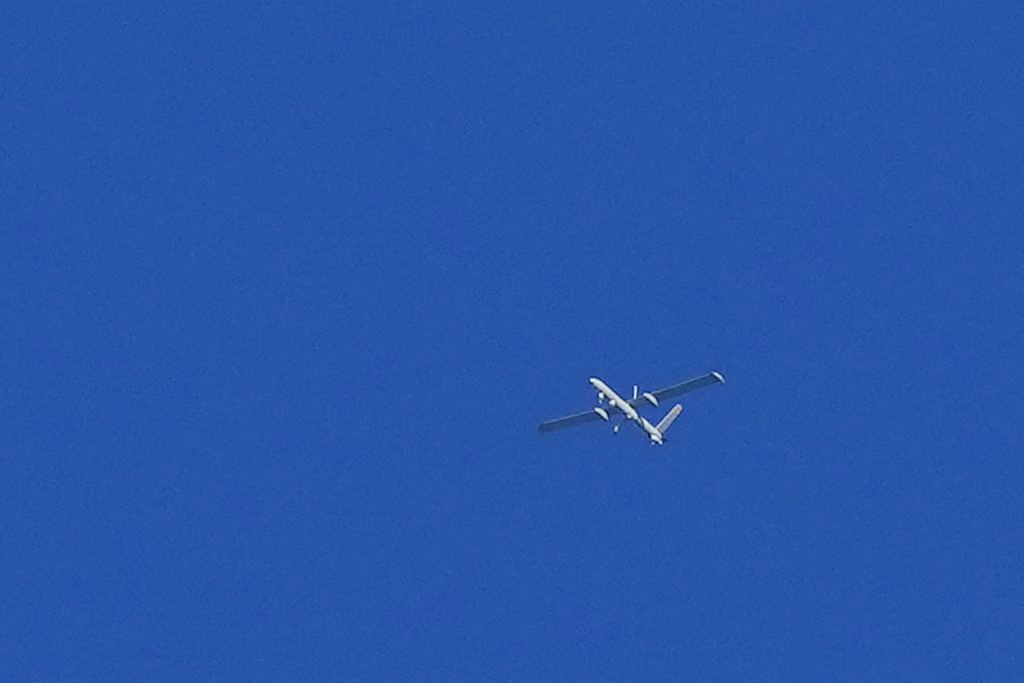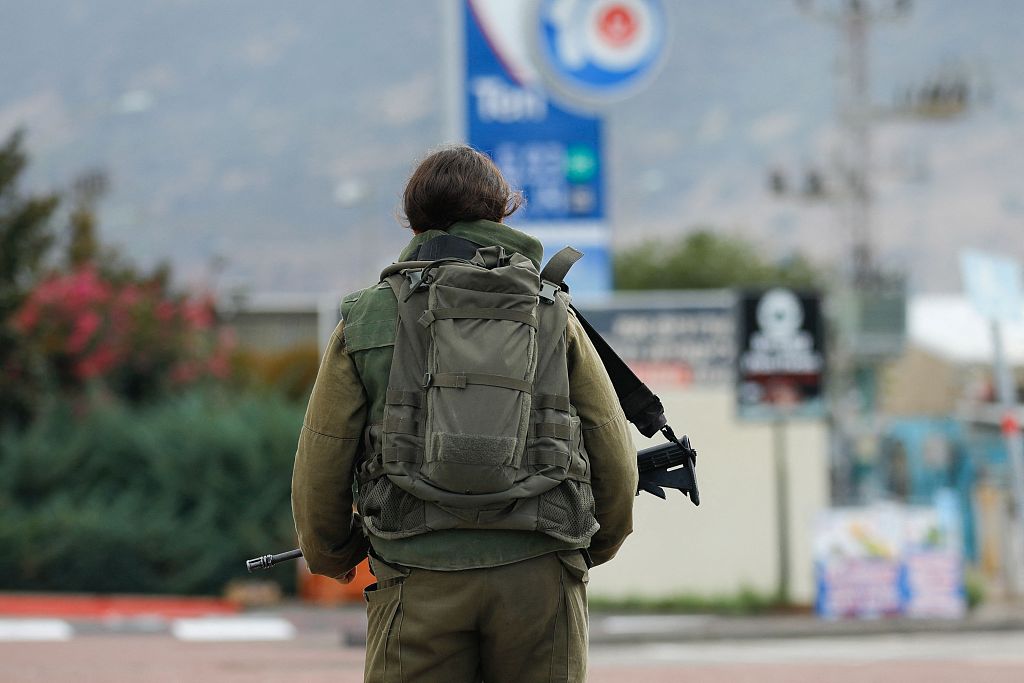Israel expanded planned evacuations of communities on its northern front with Lebanon on Sunday as cross-border clashes with fighters from Lebanon's Hezbollah intensified.
On the same day, Israeli Prime Minister Benjamin Netanyahu paid a visit to troops in northern Israel near the border with Lebanon and warned Lebanon not to let itself get dragged into a new war.
Since October 7, when the current stage of the Israel-Palestine conflict erupted, Hezbollah has exchanged cross-border fire with Israel numerous times, causing casualties. The scope of the attacks is now growing, though remains relatively small-scale and restrained, according to experts.
If Hezbollah strikes Israeli towns with missiles, or if Israel attacks Hezbollah's main territory in Lebanon, the conflict could quickly escalate, and Israel will face a two-front war, Li Shaoxian, the head of an Arab research institute under Ningxia University said.

Smoke rises from inside an Israeli army position which was hit by Hezbollah fighters as seen from Tair Harfa village, a Lebanese border village with Israel, south Lebanon, October 20, 2023. /CFP
Smoke rises from inside an Israeli army position which was hit by Hezbollah fighters as seen from Tair Harfa village, a Lebanese border village with Israel, south Lebanon, October 20, 2023. /CFP
Where does Hezbollah stand on Israel?
Hezbollah is a Shiite Muslim political party and military group based in Lebanon, where its extensive security apparatus, social services network and political organization have fostered its reputation as "a state within a state," according to the Council on Foreign Relations.
Iran supports both Hamas, which attacked Israel two weeks ago killing 1,400 people, and Lebanon's Hezbollah. Hezbollah has deep ties to Hamas, which controls Gaza, and Islamic Jihad, another Palestinian faction backed by Iran.
"Hezbollah and Hamas are brothers, sharing the same ideology and goal: the destruction of Israel and the establishment of a theocratic Islamic state. Given Hezbollah's pursuit of their values, it is impossible to see Hamas wiped out," Dong Manyuan, a researcher on Middle East issues at the China Institute of International Studies (CIIS), told CGTN.

Israeli soldiers patrol the northern city of Kiryat Shmona near the Lebanon border, October 20, 2023. /CFP
Israeli soldiers patrol the northern city of Kiryat Shmona near the Lebanon border, October 20, 2023. /CFP
Hezbollah said it was in "direct contact with the leadership of the Palestinian resistance" on October 7, the day Hamas militants carried out an unprecedented assault from Gaza into Israel. Since the attack, Hamas and Islamic Jihad, which both have a presence in Lebanon, have mounted attacks on Israel from Lebanon for the first time, including an October 10 cross-border infiltration into Israel by Islamic Jihad.
For now, both sides are maintaining restraint, not wanting the border conflict to spiral out of control, Li Guofu, a senior research fellow at the CIIS, said to CGTN. "As long as there are no large-scale military strikes and casualties, the conflict will remain small and manageable.”
Echoing Li, Dong told CGTN that "an escalation of the conflict is unlikely, and the ball is in Hezbollah's court, because Israel's main concern is how to root out Hamas in Gaza and the West Bank with the support of the United States.”
"So far, Israel is on the defensive, and Hezbollah rockets have not struck Israel in any meaningful way. If Hezbollah's subsequent rocket and missile attacks resulted in Israeli casualties, Israel would respond by launching raids on Hezbollah targets in Lebanon and on Lebanese infrastructure, causing damage and economic hardship that would be blamed on Hezbollah," Dong said.
Israel has always responded in the same with Hezbollah, Dong added.

An Israeli reconnaissance drone flies over Lebanon, as seen from Tair Harfa village, a Lebanese border village with Israel, south Lebanon, October 20, 2023. /CFP
An Israeli reconnaissance drone flies over Lebanon, as seen from Tair Harfa village, a Lebanese border village with Israel, south Lebanon, October 20, 2023. /CFP
What is Hezbollah?
Founded in the chaos of the 15-year Lebanese Civil War, the military group is driven by its opposition to Israel and its resistance to Western influence in the Middle East.
Western countries including the United States designate Hezbollah as a terrorist organization. So do traditionally U.S.-allied Gulf Arab states.
In recent years, long-standing alliances with Iran and Syria have transformed Hezbollah's armed wing into an increasingly effective military force, one that experts say would pose a formidable challenge in the event of new fighting against its longtime enemy Israel. At the same time, Hezbollah officials and other leaders in Lebanon are facing public discontent as the nation verges on failure, and Hezbollah's political power could be shrinking.

An Israeli soldier patrols the northern city of Kiryat Shmona near the Lebanon border, October 20, 2023. /CFP
An Israeli soldier patrols the northern city of Kiryat Shmona near the Lebanon border, October 20, 2023. /CFP
Hezbollah's role in Lebanese politics
Hezbollah's influence is underpinned by its sophisticated arsenal and the support of many Lebanese Shiites who say the group defends Lebanon from Israel.
Lebanese parties opposed to Hezbollah say the group has undermined the state and accuse it of unilaterally dragging Lebanon into armed conflicts.
Hezbollah has ministers in government and lawmakers in parliament.
It entered Lebanese politics more prominently in 2005 after Syria withdrew forces from Lebanon following the killing of former Prime Minister Rafik al-Hariri, who was seen by many to symbolize Saudi influence in the country.
(With input from agencies)